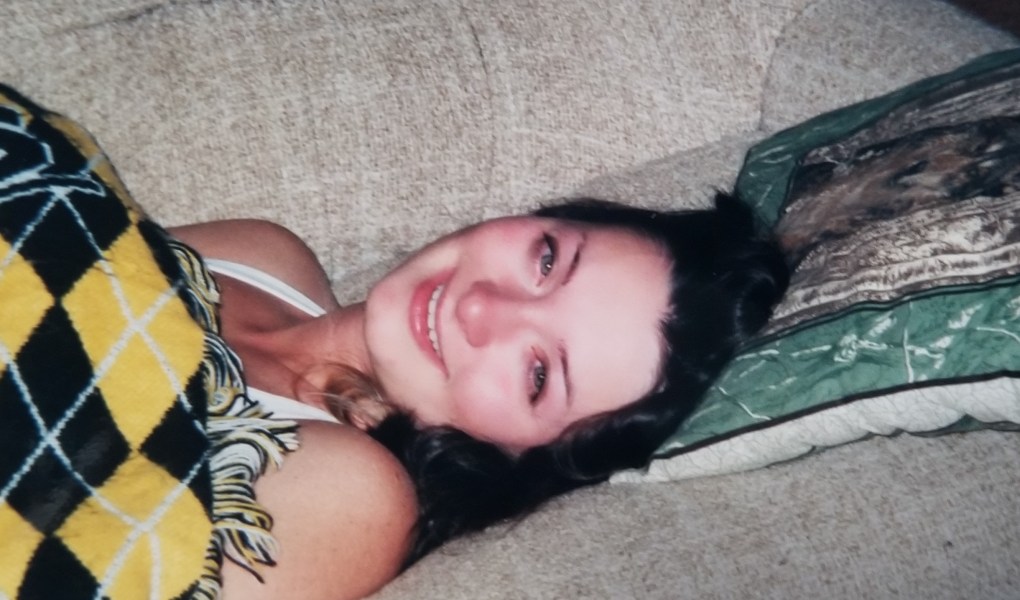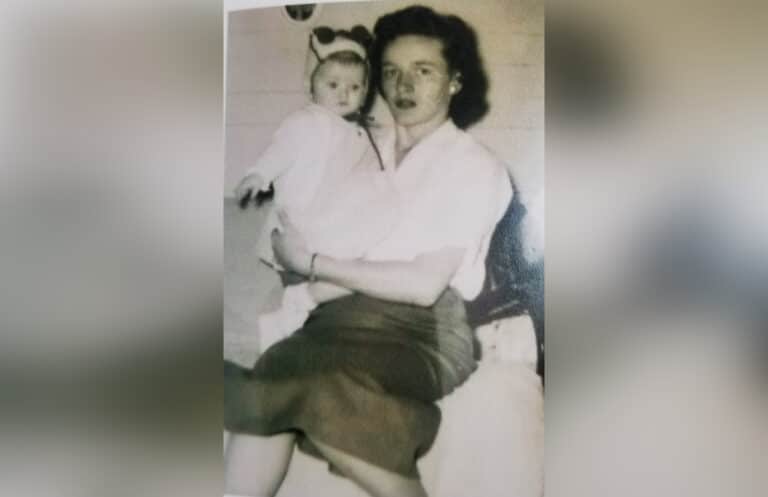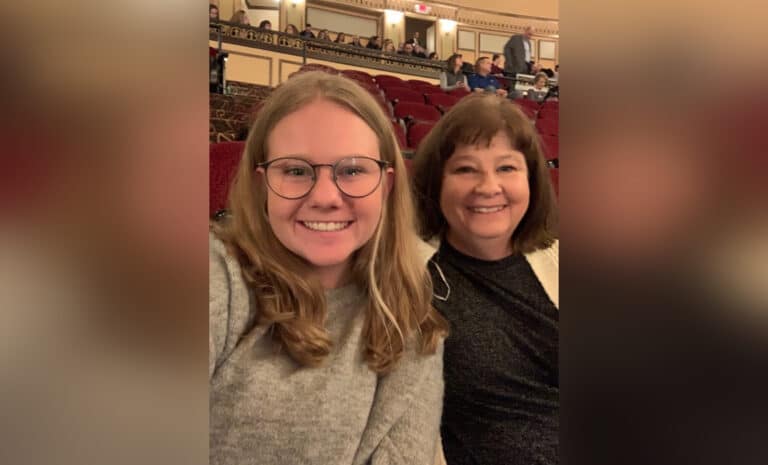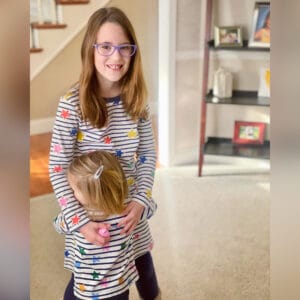This is what depression looks like for me—hidden tears with a smile. This picture was taken when I was in my early 20s, years before kids and current struggles.

As a child, I would hear my grandmother say she was “going through a spell.” It wasn’t until my adult years that I really understood what she meant. Grandmother’s “spells” were her words for depression.
At that point, I also realized the impact of hereditary depression—and it was my turn.
Growing up, I spent a lot of time with my grandmother. We lived on the same long gravel road as my grandparents, so I would see my grandmother often, and I loved seeing her.
Every Friday, I would accompany her on her weekly shopping trip into town (a small town 30 minutes away). We would stop off at the local florist to buy flowers for whoever died that week, grab some fabric and sewing items from Walmart’s (now eliminated) fabric section, and then get groceries at the locally owned Vista Foods. Sometimes we visited a person who was ill at the hospital or shopped for the perfect gift (Grandma was great at carefully considering what to get everyone—no matter the occasion, she was always thinking of others).
There were no fast food stops. Grandma packed “nabs“ (her term for crackers) and diet sodas in a brown paper bag for us to eat while we were out and about. On those trips, she updated me on her latest quilting project, her garden, and news about other people (good and bad).
But sometimes her projects would come to a halt with what she called “a spell.”
She would still attend family gatherings (along with a gift she had put a lot of thought and time into), but it would be a downer for her. Gardening, one of her beloved pastimes, became a burden. The quilt squares and sewing machine got pushed to the side. The only thing she never stopped doing was attending church.
RELATED: Sometimes Depression Looks Like Dirty Dishes in the Sink
As a child, I never understood the “spells.” My grandmother’s warm smile and energetic demeanor would change to a dismal and somber mood. During those times, she often spoke of Heaven, longing to see her mother there. During her dark times, she relabeled each of her treasured possessions with the name of the person who would receive them upon her passing. She made more doctor’s appointments and tried more medicines. I listened to her heartfelt frustration with those periods of struggle but didn’t fully grasp what it meant.
Then, one day, it would change. She would declare God’s grace in lifting the darkness for her. Normal activities resumed, and she spent her time helping and caring for others. That is until another spell hit.
But she never gave up hope, and she never stopped getting help each time.
My age gave me some understanding of what my grandmother was going through during those times. Upon graduating from college and being dumped into a less-than-glamorous economy, I ended up with a lackluster job. This frustration spiraled me into a dark place I found difficult to pull myself out of, but I eventually did. This left me confused and questioning what had happened to me mentally. Thoughts of my grandmother’s past struggles flashed in my mind.
Several years later, the overwhelming grief and devastation of losing two children plunged me into self-despair—this time it was deeper and greater than I could handle. This became my introduction to antidepressants, later finding that it was the same prescription my grandmother used.
Time marched on, bringing some comfort amidst the emotional pain. I was able to come off the antidepressant medication. Not long after, the first of our three children came along. As best as I could, I soaked in every moment of my children’s baby years. I watched them toddle around and explore, then sent them off to elementary school.
Confession was what brought me to the bottom again—but this time rock bottom.
Burdens I had hauled around for years spilled out of my mouth—but it wasn’t me talking. I’m certain it was God’s plan for me to release the weight, but I just couldn’t understand how and why he’d hold onto me afterward.
“With each action we take, we create the story of our lives.” Carmen Morais
I didn’t like the story my actions from the past had created, and my underlying depression gripped that—ultimately gripping me in a power I felt completely lost in. Some days I found myself face-down on the floor, audibly begging to be taken away, unable to bear the burdens of my past, wanting what then seemed like the only release from the pain.
Each day was a blur that blended into the next. I functioned and pressed forward to keep my children’s lives as normal as possible—all the while mine was falling apart. In my mind, I needed to make everything look OK on the outside, no matter how disrupted the inside of me was.
Creating a facade of normalcy and happiness had become a habit.
I was good at making things seem OK and planned to continue—one scene rolling into another while crumbling internally. It was bronchitis that ended up saving me from that vicious cycle.
Coughing and chest pains kept me up at night in addition to the emotional anguish. Finally, I could bear it no longer. Christmas was approaching, and I didn’t have room to fit sickness into my fragile and delicate balance. My doctor saw me in his office and prescribed the necessary medication to help with bronchitis. My mask of happiness was in full effect until he asked, with a knowing look in his eye, “Besides this, how are you doing?”
That was all it took. Those few words had an enormous impact. Not because it was just those particular words but because I knew he meant them. It wasn’t an empty question. It was a question I didn’t realize I needed him to ask me, but I’m so glad he did.
Instantly, tears spilled down my cheeks, as if they had waited for the perfect opportunity to emerge. My doctor knew me well enough to know this wasn’t like me, and he knew enough to ask me the questions that needed to be asked in order to help me. He prescribed an antidepressant for me, but equally important, he connected me with a counselor. Someone who actually wanted me to pour my heart out and then did the job of helping me sort out my messy life. Someone who didn’t know anyone in my family or me, so I could spill everything in my heart without judgment.
Recovery wasn’t instant. It wasn’t always that simple. And it wasn’t pretty.
It took work and the right resources. I had to acknowledge that, like my grandmother, I had spells. Embracing those and getting help was important. I’m not sure when my grandmother’s depression started. Unfortunately, she is no longer with us for me to ask her.
RELATED: She Lives Beneath the Storm of Anxiety and Depression
If my suspicions are right, her abusive childhood had an impact, which means she, too, raised three kids during her battles. It was probably similar to the battles her own mother faced while raising 10 kids.
She set an excellent example of getting help when you need it. Without that example, I may not have finally acknowledged the problem. I might have brushed it off or been too prideful to get help.
Check on your friends. Be genuine when inquiring—not nosy. Be patient and remember that truly listening is hard, but understanding is even harder. Provide encouragement, but don’t try to fix the problem.
If you are battling depression yourself, don’t be afraid to get help.
Each day you wait is another day that could have been a turning point. Find a doctor who is sincere and will listen to you. Seek counseling from a professional who you don’t know. That way, you don’t feel scrutinized and hold back things.
Even though admitting to having depression was less socially acceptable during my grandmother’s young adult years, I’m grateful she went against the taboo. She paved the way for a better life for herself and for generations to come.
Despite the seriousness of the situation, I had to laugh when, during her last days on earth, she told me, “Don’t cry for me when I’m gone, cry for my cats.”
Thanks, grandma, for giving me hope, laughter, and inspiration for this messy thing called life.

If you liked this, you'll love our book, SO GOD MADE A MOTHER available now!
Order NowCheck out our new Keepsake Companion Journal that pairs with our So God Made a Mother book!
Order Now














